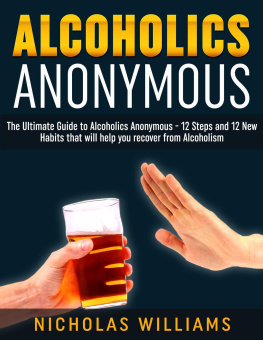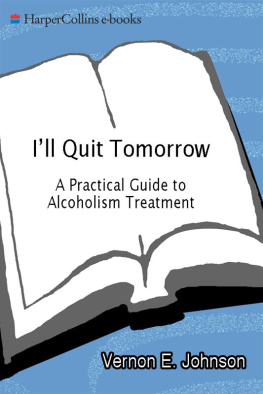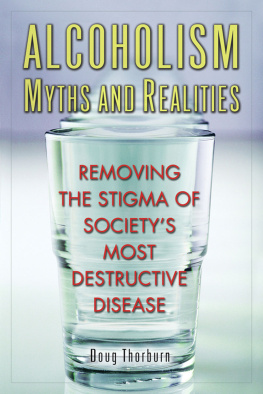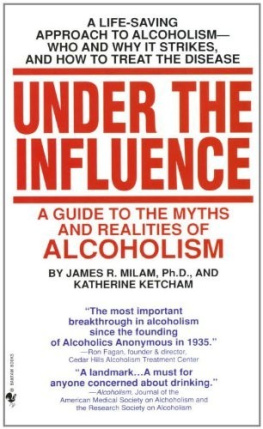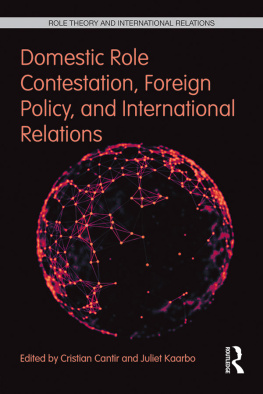
THE OTHER HALF
Wives of Alcoholics and Their Social-Psychological Situation
COMMUNICATION AND SOCIAL ORDER
An Aldine de Gruyter Series of Texts and Monographs
Series Editor
David R. Maines, Pennsylvania State University
Advisory Editors
Bruce Gronbeck Peter K. Manning William K. Rawlins
David L. Altheide, An Ecology of Communication: Cultural Formats of Control
David L. Altheide and Robert Snow, Media Worlds in the Era of Postjournalism
Joseph Bensman and Robert Lilienfeld, Craft and Consciousness: Occupational Technique and the Development of World Images (Second Edition)
Valerie Malhotra Bentz, Becoming Mature: Childhood Ghosts and Spirits in Adult Life
Herbert Blumer, Industrialization as an Agent of Social Change: A Critical Analysis (Edited with an Introduction by David R. Maines and Thomas J. Morrione)
Dennis Brissett and Charles Edgley (editors), Life as Theater: A Dramaturgical Sourcebook (Second Edition)
Richard Harvey Brown (editor), Writing the Social Text: Poetics and Politics in Social Science Discourse
Joo-Hyun Cho, Family Violence in Korea
Norman K. Denzin, The Alcoholic Family
Norman K. Denzin, Hollywood Shot by Shot: Alcoholism in American Cinema
Irwin Deutscher, Fred P. Pestello, and Frances G. Pestello, Sentiments and Acts
Bruce E. Gronbeck, Sociocultural Dimensions of Rhetoric and Communication
J. T. Hansen, Michael Patrick Madden, and A. Susan Owen, (editors), Parallels: The Soldiers Knowledge and the Oral History of Contemporary Warfare
Emmanuel Lazega, Communication and Interaction in Work Groups
David R. Maines (editor), Social Organization and Social Process: Essays in Honor of Anselm Strauss
David R. Maines, Time and Social Process: Gender, Life Course, and Social Organization
Peter K. Manning, Organizational Communication
Stjepan G. Mstrovi, Durkheim and Postmodernist Culture
R. S. Perinbanayagam, Discursive Acts
William Keith Rawlins, Friendship Matters: Communication, Dialectics, and the Life Course
Vladimir Shlapentokh and Dmitry Shlapentokh, Ideological Trends in Soviet Movies
Jim Thomas, Communicating Prison Culture: The Deconstruction of Social Existence
Jacqueline P. Wiseman, The Other Half: Wives of Alcoholics and Their Social- Psychological Situation
First published 1991 by Transaction Publishers
Published 2017 by Routledge
2 Park Square, Milton Park, Abingdon, Oxon OX14 4RN
711 Third Avenue, New York, NY 10017, USA
Routledge is an imprint of the Taylor & Francis Group, an informa business
Copyright 1991 by Jacqueline P. Wiseman
All rights reserved. No part of this book may be reprinted or reproduced or utilised in any form or by any electronic, mechanical, or other means, now known or hereafter invented, including photocopying and recording, or in any information storage or retrieval system, without permission in writing from the publishers.
Notice:
Product or corporate names may be trademarks or registered trademarks, and are used only for identification and explanation without intent to infringe.
Library of Congress Cataloging-in-Publication Data
Wiseman, Jacqueline P.
The other half : wives of alcoholics and their social-psychological situation / Jacqueline P. Wiseman.
p. cm. (Communication and social order) Includes bibliographical references and index. ISBN 0-202-30382-9 (cloth). ISBN 0-202-30383-7 (paper)
1. AlcoholicsFamily relationships. 2. WivesPsychology.
3. Co-dependence (Psychology) I. Title. II. Series.
HV132.W57 1991
362.2923dc20
91-11740
CIP
ISBN 13: 978-0-202-30382-6 (hbk)
About the Author
Jacqueline P. Wiseman is Professor of Sociology at the University of California, San Diego. She is the author of numerous journal articles, and has written and edited half a dozen books, including Stations of the Lost: The Treatment of Skid Row Alcoholics, for which she received the C. Wright Mills Award.
Dr. Wiseman has been an invited participant on many research panels; in 1985 she was delegated by the Eisenhower Foundation to participate in a study of the treatment of alcoholism in the People's Republic of China.
FOR KETTIL BRUUN (1924-1985)
Director of the Finnish Foundation for Alcohol Studies and an inspiration to researchers in that field all over the world
In these pages, a distinguished scholar in the symbolic interactionist tradition brings to us and interprets for us the stories of those who find themselves caught in a problematic and seemingly endless interaction: they are women who have come to define themselves as married to an alcoholic. Drawing on extensive interviews, Dr. Wiseman elucidates the drawn-out and agonizing process by which her informants come to their definition of the situation and of their relationship, and categorizes for us the diverse and resourceful ways they try to do something about it. Through the lens of her fieldwork and analysis, we can discern a great deal about how the wife of an alcoholic perceives and thinks about the events, predicaments, and possibilities of her marriage and her life. The analysis is strengthened by a cross-cultural dimensionthe study material comes from Finland as well as the U.S.and through interviews with comparison groups of wives of nonalcoholics and of wives of former alcoholics, whose husbands are now recovered.
Dr. Wisemans prize-winning earlier study, Stations of the Lost, focused on problematic drinkers who were mostly detached from family life. The present study can be seen as complementary, in examining the impact of problematic drinking on family life. Most people who drink heavily and become defined as alcoholics in fact have families, and are married or at some time have been married.
It has long been recognized that the family bears much of the brunt of responding to problematic drinking, and that the drinking is often highly disruptive to the process and sometimes to the existence of the family. Some systems of therapytransactional therapy, family systems therapy, and Al-Anon and other 12-step oriented therapiesinsist that the alcoholism is enmeshed in family processes, and that other family members as well as the alcoholic need treatment. Some, indeed, would define alcoholism as a family disease, and would label other family members as coalcoholics or codependent. Around the concept of codependency, a whole new mutual-help movement of Adult Children of Alcoholics has emerged in the U.S., bringing among other effects considerable changes in the composition and process of Al-Anon.
As Dr. Wisemans analysis underlines, among family members the spouse of the alcoholic bears a special burden. Partly this reflects the impact of problematic drinking on joint responsibilities in the nuclear familyresponsibilities for such matters as housing, finances and child-raising. Beyond this, as Dr. Wisemans respondents eloquently remind us, is the impact of the drinking on what lawyers call consortium"on the expectations built into marriage of the company, affection and service of the other spouse.


